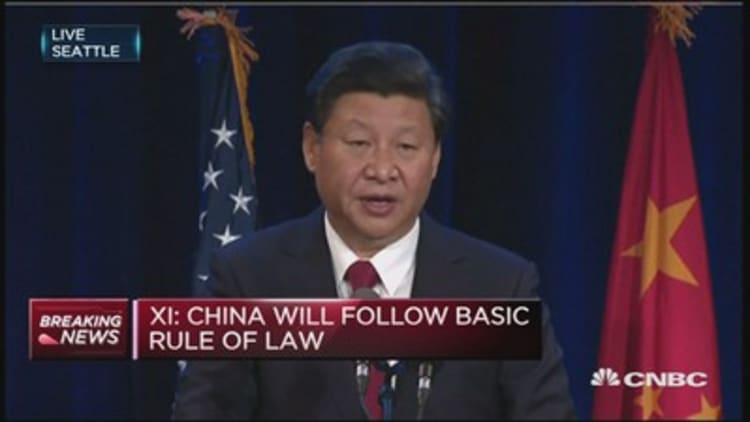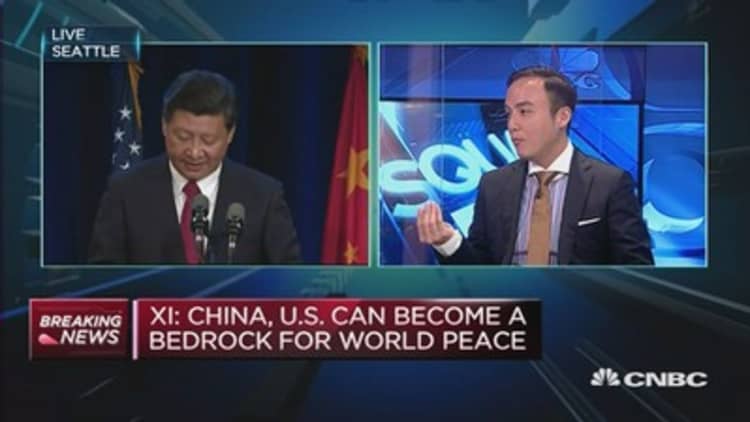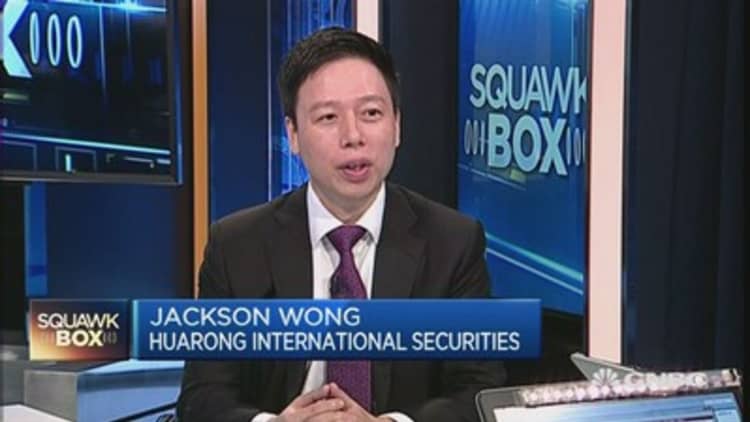


In his first policy address during a landmark visit to the United States, Chinese President Xi Jinping defended his country's growth pace and reassured the world that China's financial markets will remain stable.
"China's economy will stay on a steady course with fairly fast growth. It's still operating in a proper range with a growth rate of 7 percent...Our economy is under pressure but that is part of the path on the way toward growth," the 62-year old leader told U.S. diplomats and corporate leaders at a dinner in Seattle on Tuesday.
His comments preceded data showing a preliminary gauge of Chinese manufacturing activity falling to a six-and-a-half-year low in September.
Among the high-profile guests in attendance at Tuesday's dinner were former U.S. secretary of state Henry Kissinger, U.S. Commerce Secretary Penny Pritzker and a number of C-suite executives from Microsoft, Ford, Apple, Starbucks, IBM and many more.
While President Xi's speech touched on a range of hot-button topics from cyber crimes and human rights issues, his commentary on Chinese markets was perhaps the most key to international investors.
Xi said the Chinese stock market has now reached a phase of self-recovery and self-adjustment after a period of extreme volatility that caused worldwide ruptures.
Read MoreChina has a message markets don't understand
Despite his optimistic tone, indices in Shanghai and Shenzhen opened more than 1 percent lower during Asian trade.
He also said China will not lower the renminbi exchange rate to boost exports, reiterating Beijing's stance that there is no basis for the continued depreciation in an attempt to quash fears of an Asian currency war after the renminbi's surprise devaluation in August.
Just last week, research firm IDEAglobal said China was mulling a 15-20 percent devaluation of its currency by the end of 2016, citing an interview it had conducted with a "reliably-informed Asian source."
The yuan showed little reaction to Xi's comments however, trading flat around 6.38 per dollar in early trade but analysts said markets will appreciate Xi's vote of confidence in the long-term.
"The words we hear today will reassure investors that you may not actually see big currency moves. Stability will come first and I do think the equity market will appreciate that," Frederic Neumann, HSBC's managing director and co-head of Asian economic research, told CNBC.
To be sure, some skeptics still remain.
"When Xi says he won't devalue to boost exports, that's G-20 code. He can devalue for domestic growth. And he will," tweeted Jim Rickards, chief global strategist at West Shore Funds, after the speech.
On the economic front, the President said development remained Beijing's top priority: "We must focus all our resources on improving living standards. We want to double per capita gross domestic product (GDP)."
He noted that China's per capita GDP is only one-seventh of the United States, with 70 million Chinese living under the poverty line.
He described how as a teenager, he was sent to work in the countryside for seven years where villagers lived in earth caves, and applauded the progress rural areas have made since then.
"I recently returned. The roads were paved, the villagers had internet access and meat."
The key to development lies in reform, he warned, adding that China has the resolve to press ahead with structural and market-oriented reforms.
Read MoreHank Paulson: China economy has 'run out of steam'
On the topic of China-U.S. relations, President Xi said he wants to deepen understanding and reduce mistrust, warning that any conflict would lead to "disaster."
The two heavyweight nations must conclude a high-quality bilateral investment treaty as soon as possible, he proclaimed.
Beijing is also ready to co-operate with Washington on fighting cyber crimes and is willing to set up a joint dialogue, he said. Ahead of Xi's visit, Washington confirmed it won't impose after hinting at them earlier amid allegations Beijing launched hacking attacks against U.S. targets.
For years, U.S. authorities have expressed their concern at the level of attacks originating in China even when Beijing insists that it does not engage in such activities, and it is only the victim of digital U.S. invasions.
Last week, President Barack Obama called for an international framework on cyber security to prevent the Internet from being "weaponized."
In terms of Chinese politics, President Xi said the strict anti-corruption campaign that has sharply hurt profits of luxury retailers and casinos has nothing do with an internal power struggle. "There is no House of Cards," he said, referring to the hit television series portraying a tyrannical U.S. president.
Read More A 'perfect storm' for Chinese President Xi Jinping
The ruling Communist Party would also lose the support of people if graft went unchecked, he added.
During the 40-minute speech, experts seemed relatively pleased with Xi's performance.
"He really covered the whole litany of acute concerns that Americans have. He's obviously done his homework and I think the speech will be very reassuring to people" Orville Schell, director of the Center on U.S.-China Relations at the Asia Society, told CNBC.
Xi's promising a warmer, friendlier, more accommodating China but the question is of course, how much of that he can deliver on, Schell added.
"He touched upon all of the key issues in his remarks and closed with a strong statement supporting greater trust and confidence in the U.S.-China relationship," echoed John Frisbie, president of the US-China Business Council in a statement.

